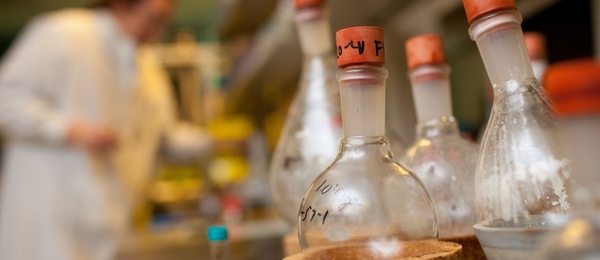Avid Radiopharmaceuticals, founded by Daniel Skovronsky, M.D., Ph.D., the former Scientific Director at the University of Pennsylvania’s Center for Neurodegenerative Disease Research, develops technology to help diagnose the pathology of Alzheimer’s and other neurodegenerative diseases. Originally located in a single lab in the Science Center’s Port business incubator, the company has since expanded its footprint to occupy a custom designed office and lab space nearly five times that size at 3711 Market Street on the Science Center’s legacy campus. Acquired by Eli Lilly & Company in 2010 in a deal worth up to $800 million, Avid now operates as a wholly-owned subsidiary of the Indianapolis-based global pharmaceutical company.
Key takeaways
- Avid is a pioneer in the development of molecular imaging agents for neurodegenerative diseases, and the Science Center has accommodated the flexible and staged growth of Avid as its portfolio of imaging products has advanced and expanded.
- Avid has occupied a number of different spaces within the Science Center, from a single lab in the Port business incubator when the company was in its infancy to the 24,500 square feet of custom-fit office and lab space it occupies today.
- The Science Center was able to help custom build the specialized accommodations required for Avid’s onsite manufacturing of radiopharmaceuticals for clinical trials.
- Avid represents Eli Lilly’s first and only presence in Pennsylvania.
Our company’s story of development wouldn’t be the same without the Science Center partnering with us through these different phases of growth.
As Avid has grown over the past decade, the Science Center has been a strong support for the company, providing both Port business incubator services and space to the growing company. As Vice President of Operations Michael Krautkramer says, “Our company’s story of development wouldn’t be the same without the Science Center partnering with us through these different phases of growth.” During its startup phase, the company also benefited from working in a collaborative environment among other early-stage firms. As Krautkramer puts it, the Science Center’s Port incubator at 3624 Market Street where Avid progressed through its early growth stages had a “vibe of entrepreneurship—people working crazy hours in tight spaces to meet their goals as they tried to grow as an organization.”
The Science Center’s support continued as Avid outgrew its space in the incubator. By the time Krautkramer joined the firm in 2009, the company had expanded to employ more than 30 people. Later that year, Avid became the first startup to graduate from the Port and move into dedicated office and lab space at 3711 Market Street. The space was designed and fitted with Avid’s specialized manufacturing needs in mind, including custom-made protective amenities to permit the safe production of radiopharmaceuticals used for diagnostic brain imaging of the pathology of Alzheimer’s and other neurodegenerative diseases. As Krautkramer explains, “We have custom radiosynthesis equipment in manufacturing cells lined with lead bricks to do the type of research we do—hence the reason that the floor below Avid had to be reinforced with steel beams. In that way, working with the Science Center and Wexford as a tenant in their building, it’s great to have that partnering kind of relationship when you have these really special needs. They understand and support it.”
Beyond their custom office and lab space, Avid takes advantage of the Science Center’s flexible shared spaces as a platform for collaboration. “We’ve used the Quorum space for some of our meetings where we wanted to create an off-site feeling,” Krautkramer says. Avid also uses shared meeting spaces to connect with the community. “We’ve used rooms in the Science Center to gather different stakeholders to talk about the local challenges of providing for Alzheimer’s disease patients and their families,” explains Krautkramer.
Avid’s FDA-approved product Amyvid is used in clinical trials around the world. As with many research and development firms, company growth is unpredictable. Krautkramer explains, “In a field like Alzheimer’s disease where there are still uncertainties, being able to grow in stages has helped Avid and is a testament to the commitment of the Science Center to help startup companies achieve their development goals.”



